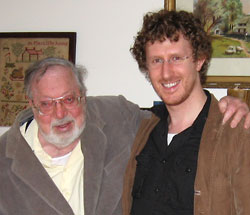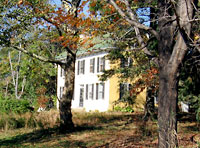The Americanist
Norman Kane has been an antiquarian bookseller for more than fifty years By Nate Pedersen Nate Pedersen is a contributing writer at Fine Books & Collections. His website is natepedersen.com.

At eighty-six years old, Norman Kane is one of the elder statesmen of the rare book trade. A Pennsylvanian for most of his life, Norman’s business, the Americanist, began in the 1950s in the unheated attic of a semi-detached house in Drexel Hill. Several years later he moved to the country, purchasing a historic farmhouse with acreage in Chester County where the Kane family lived and worked for many years. His wife, Michal, was the daughter of the American expatriate poet Walter Lowenfels. Norman and Michal had three children together while jointly operating the bookselling business. Their son, Garry, managed a successful book auction (Kane Antiquarian Auction) on the Chester County property until his untimely death. After Norman’s wife also passed away, Norman relocated to Chapel Hill, North Carolina, where his two daughters reside, and where the Americanist continues to operate today in a suburban house just south of town.
I had the great pleasure of working for Norman when I first began in rare books and enjoyed a first class education in bookmanship at his side. We sold a number of interesting books together and enjoyed an equal number of lingering lunches, discussing history, politics, literature, philosophy, and, of course, the rare book trade, while sharing a bottle of wine. I recently had the opportunity to speak with Norman about his half-century in antiquarian bookselling.
NP: How did you get started in rare books?
NK: Having two degrees and no job in the 1950s, I answered an advertisement in the “AB” [the Antiquarian Bookman] and offered my services for $50 a week. Even then, that was too modest to refuse. I went to work for George McManus in the middle 1950s. His shop was in Philadelphia, in the basement and first floor of an old brownstone near Twenty-first and Chestnut Street, right across the street from George Allen’s bookshop. McManus was an Americana business—he put out regular catalogues on this subject with a focus on Pennsylvania books. But since I had studied American literature and he had picked up many odds and ends [in this area], I set a lot of that aside and started putting out catalogues. Over time, I built up that side of the business. In those days you could still pick up a lot of very nice [American literature] books from the late eighteenth century and throughout the nineteenth century. So when I sailed off into the great book unknown with a few dozen books and $100 in the bank, dealing in literary and historical American seemed a natural. But, of course, over the years I was tempted into other areas. Inevitably, you’d get a call and you’d go into a house and a man would have one hundred art books. What are you going to say—‘I don’t sell art books?’ [Laughs]. So eventually I just became a general bookseller, but I’m still more interested in some things than in others. Witness the fact that recent purchases have included Polynesian imprints, philology, and fore-edge paintings—perhaps the indulgences of old age.
NP: Do you have a favorite catalogue that you produced over the years?
NK: I put out a list once of the ultra rare mimeograph productions of Buckminster Fuller—things he did when he went to Chicago and dreamed about skyscrapers. Nobody had ever seen the damn things so, of course, the orders pored in, but I just had the single copies. That’s the way you learn about books that you won’t ever see again! [Laughs]
NP: Do you have a favorite book fair?
NK: The Boston book fairs were the most fun. I also did a great many of them up and down the coast. One book fair was sponsored by the Essex Institute. John Updike, who came from the Redding area [of Pennsylvania], was living up there in New England. The Essex Institute people asked him to come by and make the rounds. I had brought, for fun, a six-pack of Old Redding beer to the fair. I happened to be away from the booth when Updike arrived, so Michal handed him the six pack and he got quite a kick out of that. I asked her if she got him to sign any books and she said, “Oh, no, I forgot.” [Laughs] So that was a fun thing.
NP: What personal book collections have you built?
NK: Sherlockiana, Christopher Morley, S. Weir Mitchell, Charles Godfrey Leland, houseboats, baseball, Cornelius Weygandt, and others—some I still have, and some are gone. I would say that the Morley and the Mitchell collections are my favorites, although I’m also rather proud of the Leland collection. Like the other two, he was a Philadelphian. In a sense this was opportunism as the material by and about these people kept turning up in Philadelphia. Local patriotism I guess! [Laughs]








